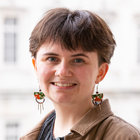Find out about the current PhD students at the Centre for Doctoral Training in Cybersecurity.
 Sergi Bray
Sergi Bray

Sergi’s work centres on the emerging threat that deepfake technology poses to systems and societies. A “deepfake” is an item of computationally-produced media, whether image, video, audio, or text, which is convincingly real (though in truth fake), the computational production of which involves, in theory, no human interaction.
- Read more
In practice, human intervention may cherry-pick only the most convincing items and clear away small anomalies that indicate algorithmic production. This human-computer synthesis would make the end result indistinguishable, by any means yet developed, from a real item. Sergi’s work has shown that humans cannot correctly label image deepfakes with familiarisation nor with assistance; in near future Sergi’s work will tackle the neo-criminal damage that deepfakes have already started to inflict upon society, as well as the future damage that deepfakes have the potential to wreak upon our world. Sergi intends to continue these threads of work in future research projects and to interweave deepfake threat and vulnerability identification into the established roster of cybersecurity considerations. Sergi is happy to be reached for more information at sergibray@pm.me.
 Phil Demetriou
Phil Demetriou

I am a Doctoral Student in the Center for Doctoral Training in Cybersecurity at University College London, advised by Prof Stephen Hailes and Dr Ingolf Becker and funded by the EPSRC. My research concerns anomaly and intrusion detection in the context of cyber-physical systems and critical infrastructure.
- Read more
My research interests lie in Systems Security, Machine Learning and Distributed Systems and my prior industrial engagements include projects in link analysis, data aggregation, anomaly detection, semantic modelling, post-quantum cryptography and Byzantine Fault Tolerant protocol design.
Beyond my doctoral research, I organise the weekly UCL Computer Science Hacking Seminar and serve as postgraduate teaching assistant for COMP0016 Systems Engineering and SECU0043/SECU0049 Cybercrime.
 Niamh Healy
Niamh Healy

I began my university education studying Law with International Law. A year abroad at the University of Leiden exposed me to the field of international relations and I realised this where my real academic interest lay. After I graduated from my BA, I began an MA in National Security Studies with King’s College London’s War Studies department.
- Read more
Following this MA I worked for a small consultancy working on different security issues, mainly nuclear non-proliferation. While working here I became interested in the international political aspects of cyber security, particularly how cyber security issues affect nuclear order and other nuclear weapons issues.
It’s exciting to join the Centre for Doctoral Training, especially as someone from a non-technical background. I’m really enjoying learning from and with my cohort about all aspects of cyber security.
My research approaches the question of cyber from an international relations perspective. I was originally focused on how ‘cyber’ was affecting how we make sense of nuclear weapons internationally (‘global nuclear order’) but I am increasingly interested in how ‘cyber’ is affecting how we make sense of international order generally, with specific reference to the English School. I am particularly interested in global governance on cyber, including the UN’s new Open-Ended Working Group as well as other bodies like the UN Group of Governmental Experts and the Global Commission on the Stability of Cyberspace.
 Antonis Papasavva
Antonis Papasavva

I am a PhD Student under the supervision of Prof Emiliano De Cristofaro. In 2016 I received my BSc degree in Computer Science from Frederick University of Cyprus where my research was in the fields of robotics, unmanned surface vehicles, and autopilot software systems.
- Read more
The work and efforts of my BSc research resulted in two IEEE publications.
In 2019 I received my MSc degree in Data Science and Engineering from the Cyprus University of Technology. During my studies at the Cyprus University of Technology my research focused on device-centric authentication, federated identity management, cyber safety, and the detection and characterization of inappropriate content online. I have demonstrated experience with working on EU-funded projects. Specifically, I took over highly responsible roles and actively contributed to ReCRED, CONCORDIA, and ENCASE projects. Part of the research I conducted during my MSc studies is published in one of the most influential conferences on Social Media Measurement: AAAI CWSM.
Currently, my research focuses on the characterization and detection of racism, misogyny, and other types of discriminating behaviour in mainstream and non-mainstream online social networks, large scale data processing, and deep learning networks.
 Henry Skeoch- submitted
Henry Skeoch- submitted

I was attracted to the Cyber Security CDT by the strong multidisciplinary training elements it contains and the opportunity to acquire structured knowledge across the various fields associated with cyber security alongside pursuing a PhD in one of the UK’s leading Computer Science Departments.
- Read more
Being part of a cohort of students with diverse backgrounds and interests also greatly enhances the overall experience and creates a real sense of community as well as bringing a deep set of perspectives to the academic challenges we encounter. Prior to joining the Cyber Security CDT, I was employed as a Research Analyst for a major global investment bank focusing on interest rate and inflation markets, which followed an MSc in Finance from Imperial College Business School. Before changing paths to Finance, I was originally a Scientist graduating with an MSci in Natural Sciences (Chemistry) from the University of Cambridge with a final year project focused on Chemical Informatics, specifically systematic extraction of information regarding current research activities.
PhD Title: The Economics of Information Security: Investment, Insurance and Evaluation
Papers published: Skeoch, Henry RK. "Expanding the Gordon-Loeb model to cyber-insurance." Computers & Security 112 (2022): 102533. Available online at: https://www.sciencedirect.com/science/article/pii/S0167404821003576
Conferences: Skeoch, Henry RK. Modelling Ransomware Attacks using POMDPs, Workshop on the Economics of Information Security, Tulsa, Oklahoma, 2022. Paper available online: https://weis2022.econinfosec.org/wp-content/uploads/sites/10/2022/06/weis22-skeoch.pdf
Organisations and individuals are increasingly facing a rapidly evolving threat from activities in the cyberspace domain that have the potential to cause severe damage to information technology equipment and/or loss of confidential data, potentially incurring significant economic costs. My research aims to analyse cybersecurity problems in economic terms and suggest how decision making on cybersecurity defences can be optimised. I have a particular interest in cyberinsurance pricing and market structure but also in understanding how to account for the specific details of often complex computer systems in economic models. This is a delicate balance: oversimplification yields models that are too abstract to draw realistic conclusions but too much intricacy makes models hard to interpret for non-technical experts. By drawing on established economic theory and developing a thorough understanding of the technical nuances of cybersecurity, I aim to produce models that offer useful practical insights to decision makers.
 Arianna Trozze- submitted
Arianna Trozze- submitted

I am a PhD researcher at UCL’s CDT in cybersecurity, focusing on financial crime. My academic and research experience has primarily centred on international policy and human geography, with a particular emphasis on environmental policy and international information and communication technology (ICT) policy.
I completed my master’s thesis at the University of Oxford in 2015 on deliberative democracy and international ICT policy and my honours undergraduate thesis at Franklin University Switzerland in 2014 on ICT policies across Latin America.
- Read more
During and following my master’s degree, I worked for the United Nations International Telecommunications Union in Geneva, focusing on digital inclusion initiatives and policies. After working in international policy for approximately a year, I found myself more interested in the enforcement arena and joined an international litigation firm.
As a legal analyst, I assisted lawyers on government enforcement defence and international judgment enforcement matters. I later joined the company’s corporate strategy department as the product manager for internal investigations and monitorships and asset forfeiture defence. My roles at this company sparked my deep academic interest in financial crime and money laundering research.
My PhD research involves detecting and prosecuting financial crime involving cryptocurrencies. My project will adapt data science-based fraudulent transaction detection methods used in traditional financial services to the cryptocurrency market and demonstrate how they can be used to effectively prosecute financial crimes involving cryptocurrencies.
The results of this project will provide a roadmap for prosecution of these offences, as well as an empirical basis for policymakers to develop evidence-based legislation surrounding digital currencies worldwide. It will also enable innovation, facilitating the entry of conventional financial services companies into the cryptocurrency arena by providing a method for conducting due diligence on these transactions in the absence of accepted anti-money laundering processes.
 Antoine Vendeville- submitted
Antoine Vendeville- submitted

I graduated and proceeded to complete a Master’s degree in mathematics in France. I did two research internships on the mathematical modelling on social networks and developed a keen interest on the subject. I was then eager to conduct deeper research in that area, and the CDT Cybersecurity gave me the perfect opportunity to do so. I applied for a PhD project regarding fake news propagation and was very happy when I got accepted. I now have the chance to be working on the topic that drives my interest, in a prestigious academic environment under the guidance of top-world researchers.
- Read more
My PhD project revolves around the question: How may a group of user be able to prevent sufficiently in time the spreading of some undesirable piece of content among them?
As Online Social Platforms have gained a lot of importance over the past years, I aim to develop mathematical methods to describe how users of such platforms form their opinions and influence one another. We are in dire needs of such analysis as social media have quickly become part of our everyday lives, and users regularly find themselves to be the target of malicious attacks: fake news, illegal advertising campaigns, bot invasions and more.
The goal of my research is to give us a better understanding on the social structure and opinion dynamics in these networks, which could in turn help us prevent such episodes.PhD title: Measurement and mitigation of the echo chamber effect in online social platforms
Abstract
In a more and more connected world, relationships and opinions are shaped and evolve through online interactions. Similar-minded users tend to cluster together, and form strongly opinionated online communities, the so-called echo chambers. The ensuing polarisation of opinions fosters the spread of conspiracy theories and hinders fruitful political debate. Research on opinion dynamics is focusing more and more on this problem, with most models considering user-level psychological and social features. Those are however difficult to evaluate in practice and there has been a dearth of empirical evaluation of these theoretical works. My PhD research project is devoted to the development of new, adequate mathematical frameworks for the modelling of echo chambers, on both a global level and an individual level. Based on these frameworks I propose algorithmic methods to mitigate the phenomenon with content recommendation. The accuracy of the theoretical models and the effectiveness of the recommendation methods is illustrated through applications on real-world data.Publications
A. Vendeville, A. Giovanidis, E. Papanastasiou and B. Guedj. Opening up echo chambers via optimal content recommendations. To appear in Proceedings of Complex Networks and Their Applications XI.
A. Vendeville, B. Guedj and S. Zhou. Towards control of opinion diversity by introducing zealots into a polarised social group. Proceedings of Complex Networks and Their Applications X.
A. Giovanidis, B. Baynat, C. Magnien and A. Vendeville. Ranking Online Social Users by Their Influence. IEEE/ACM Transactions on Networking, 2021.
A. Vendeville, B. Guedj and S. Zhou. Forecasting elections results via the voter model with stubborn nodes. Applied Network Science 6, 1, 2021.Conferences
Conference on Complex Networks and their Applications XI, 2022.
Conference on Complex Systems 2022.
Conference on Complex
Networks and their Applications X, 2021. Networks 2021, 2021.
 Close
Close

